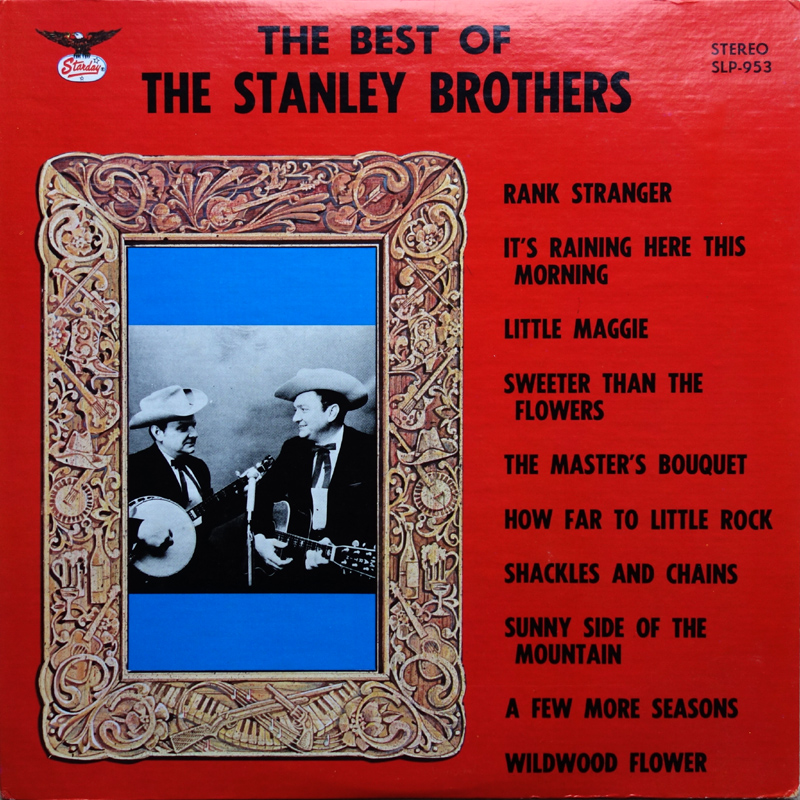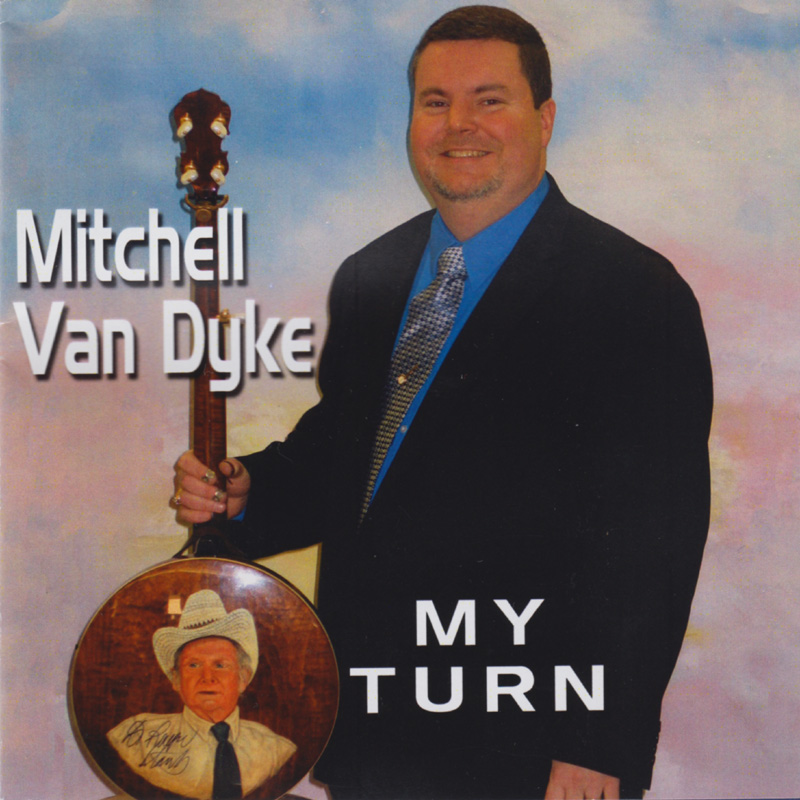- Bill Gatton Chevy Show
- Carter Stanley Interview - 1966
- Jim Kent's film 'Ralph Stanley's Bluegrass Festival'
- New WCYB Recording
- Pound Va. 1972 - Video
- Replica Rebel T-Shirt
- R.I.P. Ralph
- Roy Lee Centers Last Show
- Song & Memory Books
- Stanley Brothers - WCYB Acetate
- Stanley Standard - Carter Stanley Memorial Issue
- Suwannee River Jamboree
- Up In The Cloud - 1957-62
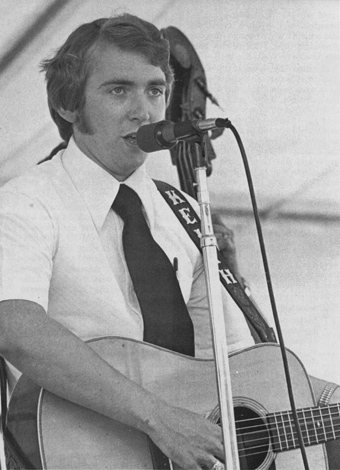
Keith Whitley:
Music - It's Everything to me... the Feeling's Down Deep
by Kathleen L. Stanton
This is an interview with Keith Whitley that was published in the Nov. 1975 edition of the now defunct 'Pickin' Magazine. It seems to have been conducted in August 1974 whilst travelling to Colorado, a few months after he had rejoined the CMB's.[1]
From some of his replies and additional comments from Ralph Stanley, it sounds like Keith was mindful of Ralph's presence and his responsibility as a spokesman for the band.
For many years, all the best Bluegrass musicians came from the area embracing Virginia, western Northern Carolina, east Tennessee, and Kentucky. Then, as the music spread, people from places as far north as Maine, south to Florida, and west to Japan started pickin' with equal vigor and enthusiasm.
The notes can be duplicated, and a fine musician can execute the intricate runs or sing with great beauty; but there is a certain "lonesome" quality that, in the words of Ralph Stanley, "... can't be learned, it's just got to be there". For this lead singer, Keith Whitley, it is as natural as breathing.
Born in the mountains of eastern Kentucky, Whitley was "raised up" on old-time mountain music. Like many other "born" musicians, he began learning music not too long after he learned to walk.
Keith: I started singin' when I was about three, I guess, in talent shows in and around Sandy Hook. Started playin' guitar when I was six and in the first grade.
Pickin': Did you start out learning to flat-pick or did you just pick it up?
Keith: Sort of; I had a lot of records by the Carter Family and the Stanley Brothers, and I just learned from that. I always listened to whoever happened to be playin' lead for the Stanley Brothers in their old records. My mom plays piano, organ, guitar, and banjo. My dad plays French harp.
Pickin': There's a lot of music in your family?
Keith: Yeah, my Grandpa's ninety-three years old; he plays banjo, clawhammer style.
Pickin': Have you always played just old-time music?
Keith: When I was real young, I played 'bout everything - I think just 'bout everybody does - but that's always what I liked.
Pickin': Did you play much in churches when you were young?
Keith: I used to play and sing quite a bit... we didn't have any choir, everybody just sang.
Pickin': Were you still in school when you decided to be a professional musician?
Keith: Yeah, sophomore in high school... didn't take long.
Pickin': What do you think you would have done if you hadn't become a musician?
Keith: Been a bum, probably. (laughter) I had one offer to go to work as an assistant manager at a supermarket, but I wouldn't have wanted to do that... not start out doin' that anyway. Might have gone to college, I guess. I would have had to finish high school first. After I started workin' with Ralph, I decided to finish by correspondence courses. I sent away, signed up, and everything... And they sent me the stuff... I don't think I ever even broke the seal on it... just didn't have any time anymore.
Pickin': Did you ever work in a coal mine?
Keith: Yes, it was actually at a coal tipple. Must've been a couple of years ago. I stood under the coal chute and moved the railroad cars along. You had to let them roll down a few feet at a time to keep the coal flowin' in to fill them. I operated the brakes, did a little work with the shovel, mostly just the brakes on those freight cars.
It was an awfully dirty job, because you were standin' right underneath the chute. I was black at the end of the day. After about two weeks, I couldn't sing a note. Some of the cars got away from you because of worn out brakes... roll all the way to the end of the track... then you'd have to push that car back by hand with a pinch-bar, just maybe two or three inches at a time for about a quarter of a mile. If you were lucky, you got a hand-loader to do it for you. I did that for about a month and I was quits.
On stage, Whitley is poised and unruffled, even in the face of unexpected situations or problems. His singing is a rare combination: powerful but with a lilt to it. It is expressive and soulful, as was Roy Lee Centers'... and Carter Stanley's. Ralph Stanley, a man very conscious of the tradition and importance of mountain music, recognized this when he first heard Keith and Ricky Skaggs, then just sixteen, singing old Stanley Brothers songs in a high school in Louisa, Kentucky, about four years ago.
Ralph helped them embark upon a recording career and began taking them along on tours, "...because I wanted to see that sound go."
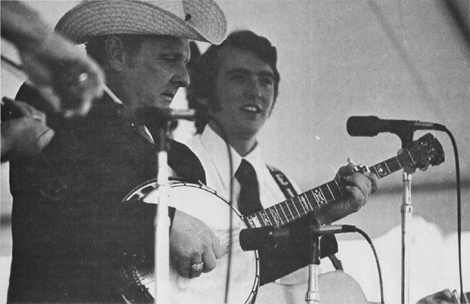
Pickin': When did you first meet Ricky?
Keith: We were fourteen years old. He was playin' in a fiddler's contest. I had a band over there, and he was playin' in a fiddler's contest. I had a band over there, and he was playin' with his dad. We started playin' together then, right after we met.
Pickin': Did he grow up around that area?
Keith: He was born in Blaine, which is about fifteen miles from where I live. We're good buddies.
Pickin': You had a band when you were fourteen? Playin' for money?
Keith: Just for expenses.
Pickin': How long had you been together when you first met Ralph?
Keith: We had only been playin' together... hardly a year.
Pickin': When did you first record with Ricky?
Keith: We were about fifteen. Ralph set it all up for us; we didn't have a contract or anything - it was just a small label (Jalyn). It sold pretty well for a first album, I guess. We were in school at the time. We recorded it in Dayton, Ohio; Ralph also recorded a couple of records for Jalyn.
Pickin': How long did it take you to cut it?
Keith: A couple of hours. We just went in like puttin' on a show. We did each number maybe once; we did a couple of them twice because they ran out of tape on one of them. The last number we recorded was I Long To See The Old Folks and we got a real good cut off it, but we ran out of tape and had to do it again. That's one of those that we did twice. The way Ralph does it, we've never spent more than four or five hours on any album that we've ever done. 'Second Generation Bluegrass' we did about a year and a half later. We were about seventeen, playin' steady for Ralph by then.
Pickin': How long did you and Ricky travel with him?
Keith: I guess I played with him a little bit longer than Ricky did, a little over two years.
Pickin': Skaggs said in an interview that his dad wouldn't let him play football or baseball because they were afraid it would wreck his hands. Did you ever get into sports?
Keith: Yeah, I used to do 'bout everything - never could pick that good; I didn't worry about my hands!
Pickin': You won a couple of music awards (Most Promising Guitar Player, 'Mulskinner News' Poll, '71 and '72), couldn't have been all that bad - either that, or the competition must have been just terrible.
Keith: (chuckling) Yep, bad, years. I got the guitar I use now from Lester Flatt. I made the deal for it in June, '74, but I didn't actually get it until August. That's a D-28 Herringbone, made in 1942. I've been offered better than $2,000 for that guitar. It's one of the best I believe I've ever heard. I remember Bill Monroe told me that it was one of the best that he'd ever heard, too. It's on all of Flatt's RCA Victor albums. A feller in Georgia made the strap for it, with my name on it.
In the two boys, Ralph Stanley saw possible heirs to his unique music. "I wanted 'em to stay with me until they could get established enough... 'til they could carry on the old style".
However, after Ricky Skaggs got married and left the group, Keith grew restless and moved away to join Jimmy Gaudreau in forming the New Tradition (now the Country Store). Upon reflection, he is still not clear about his intentions at that time.
Pickin': What did you have in mind when you went to D.C.?
Keith: I didn't know or have the foggiest idea. When Jimmy and I first started playin' together, we lived in Columbus for about three or four months before we moved to Washington.
Pickin': I heard you all were interested in country-style harmonies.
Keith: No, we just didn't want to sound like anybody else... all the progressive Bluegrass bands were doin' rock-n-roll stuff. We did just Bluegrass... I sang just the way I sing now.
Pickin': Do you think your singing or your voice has changed much?
Keith: Naw, just gettin' older, I guess. I don't know, I was influenced some by George Jones when I was young, but since I've been with Ralph, I just concentrate on his music, on singing mountain music.
Pickin': On your early recordings, you sound more country-influenced, and your voice seems deeper, maybe. Must be smoking all those cigarettes and drinkin' all that... whatever it is you drink
Keith: Now, now wait a minute! You said that, not me! Now, I don't drink, I drink water, pop...
(This last statement was surprising. For a person who does not drink, he gives remarkably vivid descriptions of Elliott County moonshine.)
Pickin': Do you like progressive Bluegrass at all, does it interest you?
Keith: Well, it's alright. I listen to it - I like to hear it - I don't really have any favorites. I'll listen to just about any kind of music, if it's really good. But the thing with progressive Bluegrass that worries me is that it's getting mixed with pop or rock. I don't like what it's doin' to the music. I wouldn't play in an electric Bluegrass band, I only like to play the old-time Bluegrass.
Pickin': Where did you play when you were with the New Tradition/Country Store? Did you see Ralph (Stanley) much?
Keith: We played a lot of different festivals - different circuits though. I didn't see Ralph at any time then. We played a lot of Carlton Haney's festivals, and Jim Clark's. We played the one in Hugo (Oklahoma), Bill Grant's.
Pickin': Were there any hard feelings between you and Ralph when you left to play with another group?
Keith: No, no. I was just young, didn't know what I wanted to do. There wasn't really any one reason I left Ralph's group then.
When the subject of Keith's excursion to Washington came up, Ralph Stanley replied, "I really believe Keith's leaving and trying on his own was good for him. I believe it was a good experience for him".
Following the death of Roy Lee Centers, Ralph asked Keith to sing lead for him. The first date they played together was in Hattiesburg, Mississippi. According to Ralph: I couldn't go with the boys, I had to fly in from Roanoke, Virginia, and I got there ten minutes before we went on the stage for the first time. Well, we tuned up, and I didn't say what we would sing. We just started out and I figured the songs that he knew, and that's the rehearsin' we did and that's the way we started... and that's all we've done since he's been with me! (Nodding) He knows the stuff, he's studied this music. And he can remember just about anything".
While performing with the New Tradition, he lived about thiry-five miles south of Washington, D.C. in Woodbridge, near Manassas, where Ricky Skaggs was living.
Pickin': Did you get to do some pickin' with him?
Keith: Yes, he used to some and sit in with us some.
Pickin': That must've been a lifesaver.
Keith: Oh, it was!
For many mountaineers, moving to the city provides some not-too-pleasant surprises. Whitley's answers are brief and to the point as he discusses his reactions to Washington.
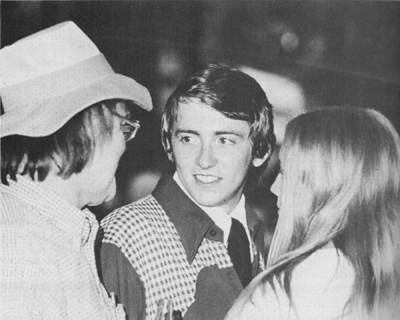
Pickin': How did you like living in D.C.?
Keith: I didn't like it at all. There wasn't much I did like about it... I don't know, comin' from where I was raised... (a shake of this head settles the point).
Pickin': Did you play many clubs in D.C.?
Keith: We lived in the clubs - just existed. We played three nights a week, every week, in D.C. Then on the weekends, we played festivals.
Pickin': I've gotten the impression that there's getting to be two different circuits developing around that area. There's New Grass....
Keith: Yeah, we got stuck in a lot of those festivals. We had to play a lot of rock festivals. We'd follow these rock bands and they couldn't hear us. Everybody was using electric instruments, and we weren't.
Pickin': How did the crowds receive you?
Keith: It all depended... some of 'em, pretty good.
Pickin': Did you ever go places where you just felt like you weren't getting through at all?
Keith: Several times. Warrenton was a bad one.
Pickin': Weren't you in Nashville writing songs for awhile?
Keith: No, I don't know how that story got started. Everybody was tellin' me I was down in Nashville, and there I was sittin' in Sandy Hook.
Pickin': With Country music, I admire certain singers, but the whole 'Nashville thing' bothers me, the flashiness. Everybody's tryin' to impress everybody else. It seems like some of the younger singers are getting away from that, Waylon Jennings, for instance.
Keith: Yeah, that part is good. But they're also changing the music; and I don't know if it's for the better.
One Sunday afternoon in late August '74 just before Indian Summer touched the highplains, Whitley was riding in a car between Brighton and Boulder, Colorado. He spotted several old cars, beautifully restored, apparently on their way to a car rally.
Keith: Boy, I'd like to have one of those old Model T's, they're nice! I'd like to get one and fix it up to drive around on Sunday afternoons... that'd be really nice.
Pickin': The ones I like are those Duesenburgs, with the running boards and all.
Keith: They're really expensive! You can get an old, say, Model T real cheap, and I know a lot of fellers who could get them running real good.
Pickin': What do you like to do when you're not working? Do you ever pick music with your old friends?
Keith: I don't really have much time when I'm home. Ralph gave me two puppies. I named the first one 'Chase', then he gave me another one. I didn't know what to name it, so I started callin' it 'Sanborn' - 'Chase and Sanborn' - the coffee brothers.
(The car passed a crossroad. Fifteen or twenty motorcycles were racing around a dirt track, sending clouds of dust up at every turn.)
Keith: I love to watch those. Used to watch my older brother race them. It scares me to death, but I love to watch it. He'd come roarin' down the track, spin around those corners, the dirt just a-flyin'! They're exciting to watch, but it'd scare me to death to do it.
Aware that he is almost continually in the public eye, Whitley reserves comment on a wide variety of topics, and tends to be discreet and noncommittal.
As the summer festival drew to a close, the hard work and extensive public exposure caught up with him, leaving him tired and edgy.
"We are just so busy - it seems we're working more now than we ever have been since I've been with Ralph. Really, I'll be kind of glad when things slow down. I'm awful tired - just need a vacation, I guess", he added quietly.
Politics, however, is one subject Whitley discusses with enthusiasm, humor, and intelligence.
"I'm a Democrat," he stated. After a few minutes of round-eyed contemplation, he added, "Maybe I should run for governor, have some handbills printed up." Then, the idea became increasingly appealing - "I could run for President, as a favorite son," he chuckled, "Sounds like a good idea!"
Pickin': Ralph says you all never practice - just sort of tune up, stroll out, and that's it.
Keith: That's the way we do it. I can recall times when it'd been six nights since we worked and we never even played a song - just walked out on stage and started.
It doesn't take me but a short while to learn a new song. I can pretty well listen to it once, read it over a couple of times, and I've got it. But usually when we record, if we do a song we're not familiar with, the paper's laying there just in case. I can learn a song in ten, fifteen minutes, though.
Although Whitley indeed appears to have a memory for song lyrics bordering on total recall, he simply shrugs, "It's just like remembering my own name". By his own admission, Keith is "...happy where I'm at right now".
Keith: Music - it's everything to me. It's my whole life - I eat it, sleep it, breathe it. The most important thing is if I can feel it, down deep. That's the thing about Ralph's music. I can feel it so deep. Even if it's not always perfect, the feeling's there, and that's the important thing to me.
Five years ago, a thin, colt-like sixteen year old stepped on stage near McClure, Va. to sing some chillingly lovely old Stanley Brothers songs.
For those who cherish good, old-time mountain music, it is heartening to watch him hit his stride. As he does so, Keith Whitley carries on a tradition that is much much more than just entertainment.
by Kathleen L. Stanton

[1] Ralph played at the 'Second Annual Colorado Rocky Mountain Bluegrass Fstial' on 23-25th August 1974. Click here to see the festival advert from the Aug. 1974 edition of 'Bluegrass Unlimited'.

